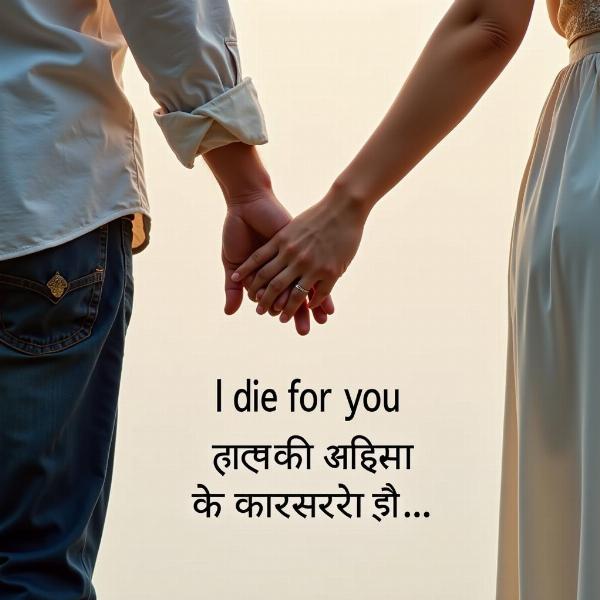Understanding the nuances of romantic expressions across languages can be both fascinating and crucial. “I die for you” is a common English phrase used to express intense love and devotion. But how do you convey this sentiment in Hindi? This article explores the various ways to express “i die for you meaning in hindi,” delving into the cultural context and providing accurate translations that capture the depth of emotion.
Expressing “I Die For You” in Hindi
While a literal translation might not always convey the intended meaning, understanding the cultural context helps choose the most appropriate phrase. Hindi, rich in expressive vocabulary, offers several options to convey the passionate sentiment of “I die for you.”
- Main tumhare liye mar mit sakta/sakti hoon (मैं तुम्हारे लिए मर मिट सकता/सकती हूँ): This is a common and powerful way to express deep love and willingness to sacrifice everything for someone. It directly translates to “I can die for you.” The word “mar mitna” implies complete self-sacrifice.
- Tumhare bina main jee nahin sakta/sakti (तुम्हारे बिना मैं जी नहीं सकता/सकती): This phrase translates to “I can’t live without you,” emphasizing the essential role the other person plays in one’s life. It expresses dependence and a sense of incompleteness without the loved one.
- Main tumhare liye kuch bhi kar sakta/sakti hoon (मैं तुम्हारे लिए कुछ भी कर सकता/सकती हूँ): A more general expression, meaning “I can do anything for you,” still conveys a strong sense of devotion and willingness to go to great lengths for the beloved.
- Meri jaan ho tum (मेरी जान हो तुम): This translates to “You are my life,” a deeply affectionate expression emphasizing the importance of the loved one. It highlights how integral they are to one’s existence.
- Main tumse behad pyaar karta/karti hoon (मैं तुमसे बेहद प्यार करता/करती हूँ): While simply meaning “I love you immensely,” using “behad” (extremely) intensifies the expression, conveying a profound depth of feeling.
 Hindi Translation of I Die For You
Hindi Translation of I Die For You
Choosing the Right Phrase
The choice of phrase depends on the specific context and the level of intimacy between the individuals. While “main tumhare liye mar mit sakta/sakti hoon” is a strong declaration of love, it might be reserved for more serious relationships. “Meri jaan ho tum” is more casual and frequently used in everyday conversations.
Beyond Literal Translations: Cultural Nuances
Understanding the cultural context is crucial. Indian culture often emphasizes respect and restraint in expressing romantic feelings, particularly in public. While passionate declarations exist, they are generally expressed within more intimate settings.
Why “I Die For You” Resonates
The phrase “I die for you” resonates because it taps into a universal desire to express profound love and commitment. It conveys a willingness to go to extremes for the beloved, a sentiment that transcends language barriers.
Conclusion
Expressing “i die for you meaning in hindi” involves more than just a literal translation. It requires understanding the cultural nuances and choosing the appropriate phrase that effectively conveys the intended depth of emotion. Hindi offers a variety of expressions to capture the essence of this powerful sentiment, allowing individuals to articulate their love and devotion in a way that resonates within the cultural context. Remember to choose the phrase that best suits your relationship and the specific situation.
FAQ
- What is the most common way to say “I die for you” in Hindi? Main tumhare liye mar mit sakta/sakti hoon is a common and powerful expression.
- Is it culturally appropriate to use these phrases publicly in India? While passionate expressions exist, Indian culture generally favors more restrained displays of affection in public.
- Can I use “Meri jaan ho tum” casually? Yes, this phrase is commonly used in everyday conversations to express affection.
- What if I want to express deep love without sounding overly dramatic? “Tumhare bina main jee nahin sakta/sakti” or “Main tumse behad pyaar karta/karti hoon” are good alternatives.
- Are there other ways to express intense love in Hindi? Hindi is rich in expressive vocabulary. Exploring poetry and literature can reveal more nuanced ways to express love.
- What does “mar mitna” imply? It implies complete self-sacrifice and devotion.
- Is it essential to understand the cultural context when translating romantic phrases? Absolutely! Cultural context plays a vital role in conveying the appropriate meaning and avoiding misinterpretations.
Meaning-Hindi.in is your trusted partner for accurate and culturally sensitive Hindi translations. We offer a wide range of translation services, including business and commercial document translation, certified and legal document translation, technical and user manual translation, website and localization services, educational and academic document translation, and express translation services. Our team of expert linguists ensures that your message is conveyed accurately and effectively, respecting cultural nuances and linguistic subtleties. Contact us today for your Hindi translation needs at [email protected] or call us at +91 11-4502-7584. Meaning-Hindi.in is committed to providing high-quality translation services tailored to your specific requirements.